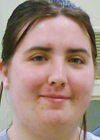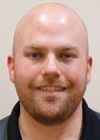Three Wichita State University physics students are contributing to a research project that is giving them a chance to experience hands-on research on a global scale.
Undergraduate students Jeanette Bergkamp, Richard Bonde and Matthew Onstott have joined WSU professor Nick Solomey and assistant professor Holger Meyer in their research on the $127 million northern Pierre Auger Cosmic Ray Observatory site, being built in Lamar, Colo.

Jeanette Bergkamp
The observatory will study ultra-high energy cosmic rays, which are charged particles that constantly rain down on Earth from space. These high-energy rays are an area of physics research that remains somewhat mysterious to scientists.
New experiences
Since 2004, The Pierre Auger Observatory near Malargue, Argentina, has been studying cosmic rays in the southern hemisphere. The northern site will conduct similar research. Nearly seven Universities are collaborating on the project, which is still in the testing phase.
“Any kind of practical research is very, very useful if you want to go on further with a degree,” she said. “It helps as far as a resume – being able to say I have done research, because that’s a lot of what they (employers) look for in a graduate assistant.”

Richard Bonde
“We want to be sure it’s working and to make sure we are reading what we are supposed to be reading,” Bonde said.
Working on those computer programs is a new experience, Bergkamp said. And getting to work in a collaborative effort is something that helps her become a more well-rounded researcher.
“I’ve gotten the chance to work as a collaborator,” she said. “Sometimes you don’t get to really do that, especially with physics, where a lot of it is solitary learning.”
Solomey said by taking on such a large project, the students are getting invaluable experience they can’t get just from a textbook.
“I think the students take from it the concept of how do you build something big,” Solomey said. “You (normally) have a lot of people doing little things in a lab. But how do you build something like the Hubble Space Telescope? How do you build something super enormously big, like a Dreamliner? They are seeing that for the first time.”
The students are also learning that what they’re doing is important to such a big project.
“It has lots of pieces that all have to work, and every one’s task is crucial,” Solomey said.
Read more about the northern Pierre Auger Cosmic Observatory. project.

